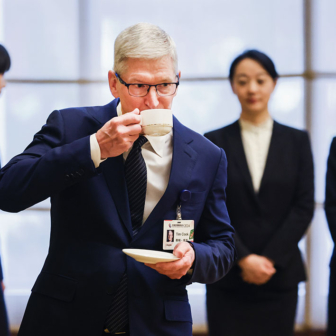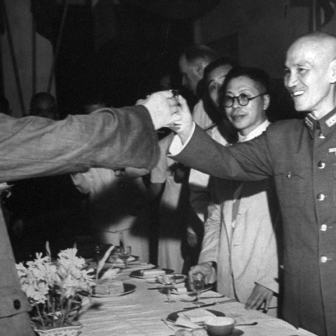The call woke me in Hong Kong after midnight. Tai Ming Cheung, a young colleague on the Far Eastern Economic Review, had got back to the Beijing bureau after witnessing extraordinary scenes in the streets. His voice conveyed his shock: “The PLA have gone in. They are shooting people. There are tanks.”
The next day a call came from bureau chief Robert Delfs, crouching under his desk. Passing People’s Liberation Army troops were raking the Qijiayuan compound, home to foreign diplomats and journalists, with machine-gun fire.
The crisis in Beijing had been going on since 15 April. Many of us had expected the student protests in Tiananmen Square to have dwindled, mollified by a compromise between reformists and hardliners in the Chinese Communist Party. Some visiting journalists had gone home, the Sydney Morning Herald’s colour writer Peter Smark after racking up $20,000 in expenses for himself and supporting crew.
From what we now know, we shouldn’t have been surprised by the slaughter of 4 June 1989. Three weeks earlier, supreme leader Deng Xiaoping had embarrassed visiting Soviet leader Mikhail Gorbachev by praising the Soviet Army’s shooting of Georgian nationalist demonstrators in Tbilisi in April. Gorbachev had disowned his own army’s actions, and the Tiananmen students were holding up portraits of this exponent of glasnost and perestroika.
As the thirtieth anniversary of the Beijing massacre approaches, there is still no hint of backdown or apology from the Chinese Communist Party. In fact, the fall of the Berlin Wall in November 1989 is seen as vindication of the party’s brutality. When communist hardliners in Moscow tried to halt the trend with their coup attempt against Gorbachev in 1991, the Chinese communists applauded. But they eventually had to accept the end of the Soviet Union and the toppling of communist regimes across Europe and in nearby Mongolia.
Since then, expectations of a convergence with the West have repeatedly been foiled by party action. The internet was seen as the latest potentially fatal breach in China’s information dykes, but the party has added its own twist, adopting the technology of “surveillance capitalism” — facial recognition, artificial intelligence, big data — to deepen social control.
This year, as well as the looming Tiananmen and Berlin Wall anniversaries, the Chinese leadership will need to manage the sixtieth anniversary of the 1959 invasion of Tibet and the flight of the Dalai Lama. Two other events are more congenial to the party — the 4 May 1919 student movement against foreign enclaves, and the 1949 founding of the People’s Republic — but could also risk provoking expressions of dissent.
Xi Jinping is taking no chances. In January he convened top cadres at the Central Party School to deliver a dire warning. “Globally, sources of turmoil and points of risk are multiplying,” he said. Inside China, meanwhile, “the party is at risk from indolence, incompetence and of becoming divorced from the public.”
Last week, ahead of today’s opening of the annual meeting of the National People’s Congress, the Central Committee reminded party members about “enhancing the political work of the party and some key points, such as consolidating political faith, upholding the party’s political leadership, improving the party’s political capacity, purifying the political atmosphere, and effectively enforcing [this] directive.”
Rather unusually, the directive also urged comrades to “resolutely prevent not believing in Marx and Lenin and believing in ghosts and spirits, not believing in the truth and believing in money.” As China scholar Geremie Barmé has noted, this harks back to a collection titled Stories About Not Being Afraid of Ghosts, published in 1961 under the auspices of Mao Zedong.
But Xi Jinping is no throwback to Mao, despite having made himself effectively chairman-for-life by having term limits removed. Mao was frequently at war with the party, at one point exhorting students to “bombard the headquarters” during the Cultural Revolution. Xi and his father, a PLA general, were victims of that turmoil. His turgid “Xi Jinping Thought on Socialism with Chinese Characteristics in a New Era” is all about harmony, stability and unquestioned party control (under his own leadership, of course). His police have recently been arresting students who attempted some practical Marxism by organising factory workers.
“The goal of Xi Jinping Thought is not to launch a cold war with the West, or to export China’s political model,” as the University of London’s Steve Tsang writes. “Rather, Xi wants to shore up the authority of the party-state — and his own brand of authoritarianism — within China, including by ensuring that Chinese are not exposed to liberal-democratic ideas.”
More than ever, the party is pursuing Deng Xiaoping’s example from Tiananmen, though modern surveillance tools allow it to forestall any coalescence of unrest into a systemic challenge. But is Xi Jinping throwing out the more important lesson of Deng’s leadership — that high economic growth is only possible if the party unleashes private entrepreneurship, cuts back on state planning, and improves monetary and fiscal management?
As the US economist Nicholas Lardy notes in his new book The State Strikes Back: the End of Economic Reform in China?, Xi has thrown resources back at state-owned enterprises, kept zombie state-owned enterprises alive, and attacked tall poppies in the private sector through his anti-corruption campaign. Economists debate whether this has affected economic growth, but it can’t help to have the most vibrant part of the economy curbed. Xi could also be storing up future financial crisis by turning on the lending taps to keep growth at 6.5 per cent a year, the level generally seen to be necessary to maintain social stability.
After being the world’s worst-performing major share market in 2018, China has rebounded mightily this year. The reasons are murky, but are doubtless linked to a US$477 billion jump in credit in January — so big that premier Li Keqiang, unlike Xi a trained economist, distanced himself by warning about “new potential risks” from record lending.
Much of this credit-fuelled growth will come from construction, despite China already having some sixty-five million unoccupied dwellings. This in turn requires massive amounts of energy, mostly coal, to create the cement, steel, aluminium and electricity required. As Australian energy-climate analyst David Leitch put it, with only a touch of exaggeration, “Stop China’s construction industry and you stop global warning.” Of course, you might also stop Australia’s projected budget surpluses.
Xi is probably smart enough to see that this model can’t be endlessly propelled into the future. Hence his drive to modernise the economy through rapid technological advances — made by whatever means China can get away with — and export much of this surplus raw material capacity along the Belt and Road. Both efforts are meeting resistance inside and outside China, with much hanging on Donald Trump’s understanding that it’s not just a matter of quick fixes to trade balances.
There is another event in 1989 that is probably not on Xi’s list of awkward anniversaries. In May that year, the Bank of Japan began raising interest rates to try to deflate a “bubble economy” that saw share and property values at absurd levels (making the grounds of Tokyo’s imperial palace worth more than the entire land mass of California, for example).
The bubble kept inflating, with the Nikkei stock index hitting a never-matched peak at the end of 1989, before collapse to half that level by August 1990. Property values plunged. The business-banking establishment kept zombie companies alive through a deflationary “lost decade” that Japan’s government is still trying to banish. Then population decline and ageing set in — just as the trend intensified in China despite the lifting of the one-child policy (another unfortunate Deng Xiaoping legacy) in 2015.
Xi might thus be drawing the wrong lessons from 1989. The medium- to long-term risk to the Chinese system could be stagnation and pollution — stuck with “secondary power” status — rather than collapse. No wonder reports are starting to come in about a demoralised business class, and fewer couples are having babies. •




